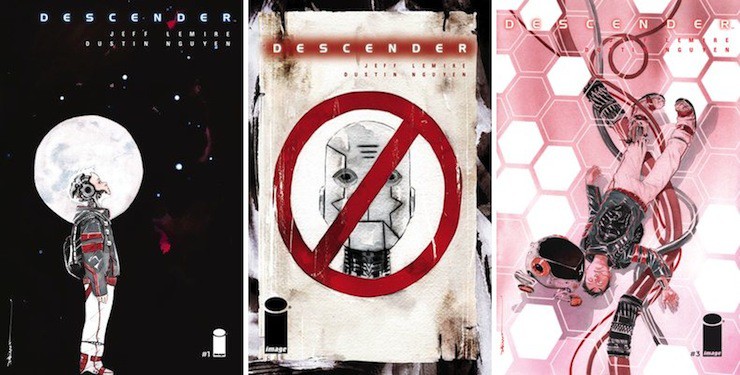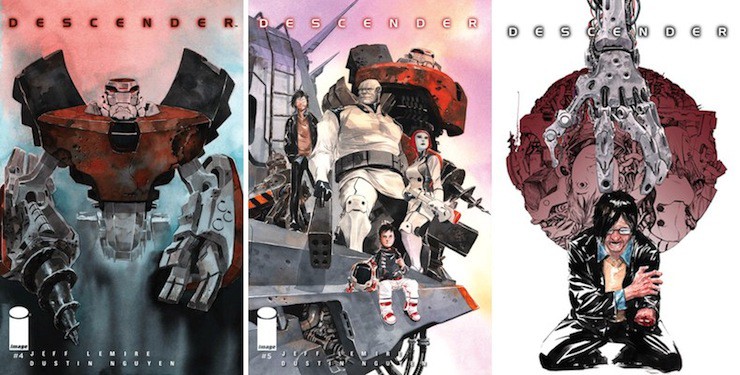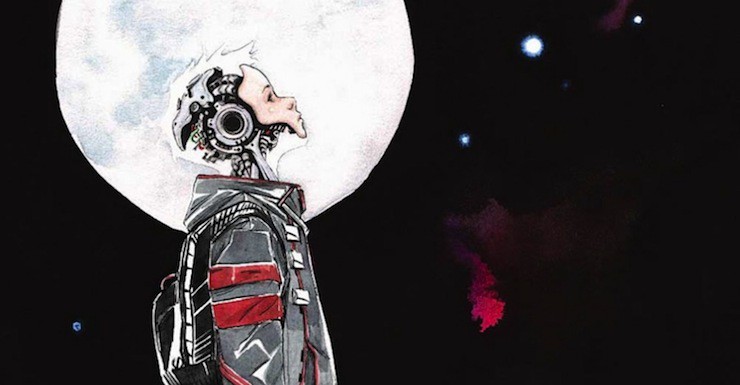Combining elements of space opera and the Pinocchio-like adventures of an innocent robot boy, Jeff Lemire and Dustin Nguyen’s Descender has been one of the big hits of the year in comics; before the first issue was released, Sony announced that it had secured the rights to develop a Descender film. Amidst the bustle of the convention floor at SDCC, I sat down with writer Jeff Lemire and artist Dustin Nguyen to talk about the place of artificial intelligence stories in the current zeitgeist, their collaborative process, and where Tim-21, his faithful robot dog, and homicidal friend and protector Driller would be going next.
I feel like artificial intelligence is having a moment right now in pop culture; you mentioned Ex Machina in the Descender letter column recently, and even Age of Ultron fits to a cetain extent.
JL: When I conceived Descender, I wasn’t really aware of these other things coming at the same time. And it’s not like you’re consciously trying to be part of any kind of movement or trend, but clearly you’re right, there does seem to have a little bit of a spike in pop culture, for sure. I think it’s just a reflection of the time we live in. You know, you’re recording this on your phone right now and it’s just—technology is leaping ahead and ahead so fast now. I started in comics in 2005, ten years ago, and at that time I didn’t have a cell phone. I don’t even think I had a computer myself, you know. And just in those ten years, how much technology has changed. We certainly are on the cusp of some sort of—I don’t know, they call it the Singularity, or whatever, but I think we’re staring it down now, and I think that’s why it’s so present in pop culture, because it’s so imminent.
It’s kind of like this reaction to pervasiveness of stuff like a smartphone.
JL: I think so, yeah. I don’t know if that’s why—I just want to tell a cool sci-fi story about a robot, so I certainly didn’t think of it as a reflection of anything that’s going on. But I think that’s why we’re seeing it, sure. I mean, technology becomes a bigger part of all of our lives every day and it’s just exponential, so it’s not hard to see that technology eventually becoming somehow equal to us or almost a sentient thing itself.
Of course, with Descender—the tech is one thing, but it is a very human story, ultimately. What are some of the influences and ideas that you had going into it?
JL: Tim-21, the main character, is probably the most human character in the book, and I’m not so much interested in telling stories about machines as people. So in this case it’s what those machines tell us about ourselves and the people around them—using robots, AI, as a metaphor for the Other, the outsider, whatever that means, whether it’s racially, sexually, whatever. I think it’s still a very powerful metaphor to use. I think I was just trying to use robotkind and machine-kind as this way of exploring racial relations and things like that. But on a bigger level I just wanted to tell a really great space opera, sci-fi story. Certainly Stanley Kubrick is probably the biggest influence on the book: 2001, and A.I. And also some manga, Urasawa’s Pluto—stuff like that if you’re looking for direct influences.

I was wondering, Dustin, if you could talk a little bit about some of the challenges and rewards you find in using watercolor.
DN: I’ve always liked painting watercolor, and Jeff’s always had this really—I use the word “handmade” feel to all his work, and I thought it was perfect to use that with him. If it were any other writer I worked with, I probably just would have gone digital, which makes it move a lot faster. It’s a challenge, but it’s also a good way to limit myself from overloading myself on work, because [with] watercolor, you can only work it so much before you kill it, you overdo it. So it limits me to what I can do, but at the same time, it forces me to do just the important things. And instead of going for really heavy-on design, I go for atmosphere. And I think it works really well with Jeff’s work. His work is always very atmospheric, like when he worked on Sweet Tooth—just wandering down a barren abandoned road, it felt like you were actually there, and I think I wanted to find some of that as well with this story.
JL: I really think the watercolor decision is probably what’s made the book successful because at the end of the day, there’s just so many comics out there, so many sci-fi comics. I think the watercolor look has really helped it stand out and find an audience and separate it from the pack. And it’s kind of cool; it’s a book about machines and is such an organic medium. So that’s kind of the whole theme of the book, human and machines intermingling, represented in the drawing style—where he’s drawing these very technical robots and things, but executing in this organic way.
DN: And I have to point out—I hate to always say “oh, because it’s painted it’s a special book”; I feel bad because there’s guys out there doing amazing watercolors, so I don’t want to make it like that’s our hook. I do enjoy a lot of the books out there, and a lot of people do it, but like Jeff said—it almost fights each other and balances each other out, with the amount of tech and doing something really organic. And a lot of the illustration, it reminds me of when you read the old manga, they would only do three or four pages in color, and the rest was in black and white. And I loved looking at the covers. There are mistakes, there are flaws in there, but it’s all part of being the imperfect look of it that makes it fun.
What’s a typical day, week, unit of collaborative time?
DN: As little as possible. We don’t like each other much. (Laughter)
JL: You know, it’s probably the easiest collaboration I’ve ever had. We talk so little. And not because we don’t like each other but because we don’t need to.
DN: Yeah, we don’t need to.
JL: I write the scripts and he just draws them; we don’t even communicate or anything. I just trust him completely.
DN: And he’s like ‘oh, you can change anything you want’ and I’m like, ‘dude, thee script is perfect!’…It’s how I feel like a lot of books need to be done, just two or people.
JL: We don’t get in each other’s way at alll we have complete trust. I think we both have a huge amount of respect for one another in what we do and we just want each other to do that, and it just comes together perfectly.
DN: I think if you find someone and they’re really good at what they do and you really like what they do, you should really just trust them. And the scripts come in and they’re exactly what I would want to work on. There’s nothing on there that I can say “oh, this needs a little—” no, there’s nothing there, it’s really exciting. I read his scripts—Kindle has this program where you can send yourself emails to the Kindle and it transfers it to an e-format book. So I format it to look like a book and I read it like a novel. I have all his scripts in there.
So with the visual designs of the book, is that something that comes out the script?
JL: I give pretty vague descriptions and he just goes nuts.
DN: I think—we talk about a lot, we talk about what we want to feel from looking at it, and that kind of thing.
JL: Yeah, I think we probably talk a lot less than other people, I mean—I want the book to look like a Dustin book so I let him design the stuff, and he’s so much better at it.
DN: And I want it to read like a Jeff book,
JL: We have a lot of common influences too, so that helps. It gives you a shorthand where you don’t have to try to explain what I want. I know a lot of Jack Kirby stuff from the seventies was really influential on me in this book, like the Eternals, and stuff like that, those giant Celestials and things, so I’m like, “make a Celestial, a big guy like that!”
DN: It’s easy. I think we’re in a good time right now where you can talk about anything in pop culture and people will get it. We’re like the same age too, which helps a lot. We weren’t into the same things but we saw the same things at least.
Image seems to be really friendly to SF and SF storytelling; I was wondering if you had any thoughts on that.
JL: I think they’ve had a certain amount of success at it with Saga and now Descender, so it opens the door for other people to come and try stuff. I feel like SF comics have had a huge boom since Saga, because it was such a big hit. I think we’re probably near the end of that wave. Something else is going to hit now. But you know, the good stuff rises to the top. I think Image is so good at all the genre stuff because they’re so hands-off. You work for the bigger companies doing general work and there’s so many cooks in the kitchen. You can still do those big bombastic stories here, but it’s just me and Dustin’s vision, with no one interfering.
DN: And I think content is always key. I think instead of trying to make a SF book, we wanted to make a good book that we both enjoyed.
JL: It wasn’t about SF, it was about Tim and his character where he goes and the SF stuff are the trappings around it.

Before the first issue even hit the stand, there was the movie happening. How did that come about?
JL: We announced the book here last year, at this show, in San Diego, and just had that promo image that’s hanging up there and a brief description. And we immediately had interest form Hollywood. And that image is very evocative that Dustin did; that’s really the reason why we had so much interest.
DN: We had the first issue kind of roughed out, didn’t we?
JL: Yeah.
DN: We just had a plot.
JL: I think the reason things happened like that is that I tend to work really far ahead on everything, because I’m juggling a lot of books, so in Descender’s case, I already had the first arc written and the whole series mapped out—a pretty detailed series bible of the whole thing before the first issue even came out. So we were able to show producers the shape of the whole thing, and that’s why the deal was done early like that. But honestly, I think it just goes back to that image Dustin did, it really seemed to capture a lot of things.
DN: Thanks, man. It’s weird, because Image said “hey, we need a promo for a thing” like, on a Friday, “we need it by Monday.”
JL: So quick, yeah.
DN: Quick turnaround, yeah. But it was really the story; when we talked about it, we knew what we wanted to do and it was really fun.
JL: Yeah, I think it’s because we had the whole thing figured out before we started, we were able to have really good conversations with those producers and they got a real sense of what it was they were going to be buying.
So you said you had the whole thing planned out; I’m not going to ask the “what’s going to happen next,” but what are some of the general ideas and places, literal or figurative, that you’re looking at going?
JL: It’s always a tough one because you don’t want to spoil things, but in the first issue, at the back we had the atlas of the different planets in the solar system that we’re working in. There’s nine different planets, and I think we want to spend a lot of time of each of them…we worked really hard to give each planet its own identity, its own look, its own purpose within the story, so you’ll see a lot of planet-hopping and we’ll see this expansive universe through the eyes of this boy. Certainly the mystery of the Harvesters is going to be ongoing, the thing that propels the narrative, but you know, the trick with all of it is, you want to go bigger and bigger and show more and more, but you don’t want to lose what it’s really about, the quiet little moments between Driller and Tim, so really it’s just keeping the focus on the characters despite the expanding canvas.
Anyhthing you’re particularly looking forward to working on?
DN: Killing everyone, turning them into robots? (Laughter) If I said it, it would spoil a lot.
JL: There’s a desert planet in issue six.
DN: The gas planet would be my favorite, and it’s not because I don’t want to draw backgrounds; it is just the idea of a planet entirely made of gas. I’ve always been fascinated by planets like Uranus and and I think parts of Venus. When I was little, I wanted to be an astronaut—to see different environments, and just to imagine yourself being on a planet with only gas, and gravity so low that you actually wouldn’t be able to move around without floating—that stuff’s fascinating to me.
JL: Yeah, it also has sentient gas creatures living on it, which is fun.
DN: I just always laugh when I hear the words “gas creatures.”
JL: Exactly.
DN: Childish, childish.
Dustin, before you got here I was asking Jeff about this moment of stories of robots and AI and was wondering about your thoughts as well.
DN: I think it’s not so much a trend, but it’s just basic human fascination with something that’s not about us. We think we’re the only smart things in the world and everything is is like, an animal, but when you have something like AI it’s almost like it’s part of us, because we created it but—I think it’s just common human fascination with that.
Karin Kross has just returned from her seventh SDCC, and she, her husband Bruce, and her friends Shellie and John are posting about SDCC at nerdpromnomnom. She can be found elsewhere on Tumblr and Twitter.










